|
Aug
29
2024
|
|
Posted 1 years 141 days ago ago by Admin
|
|
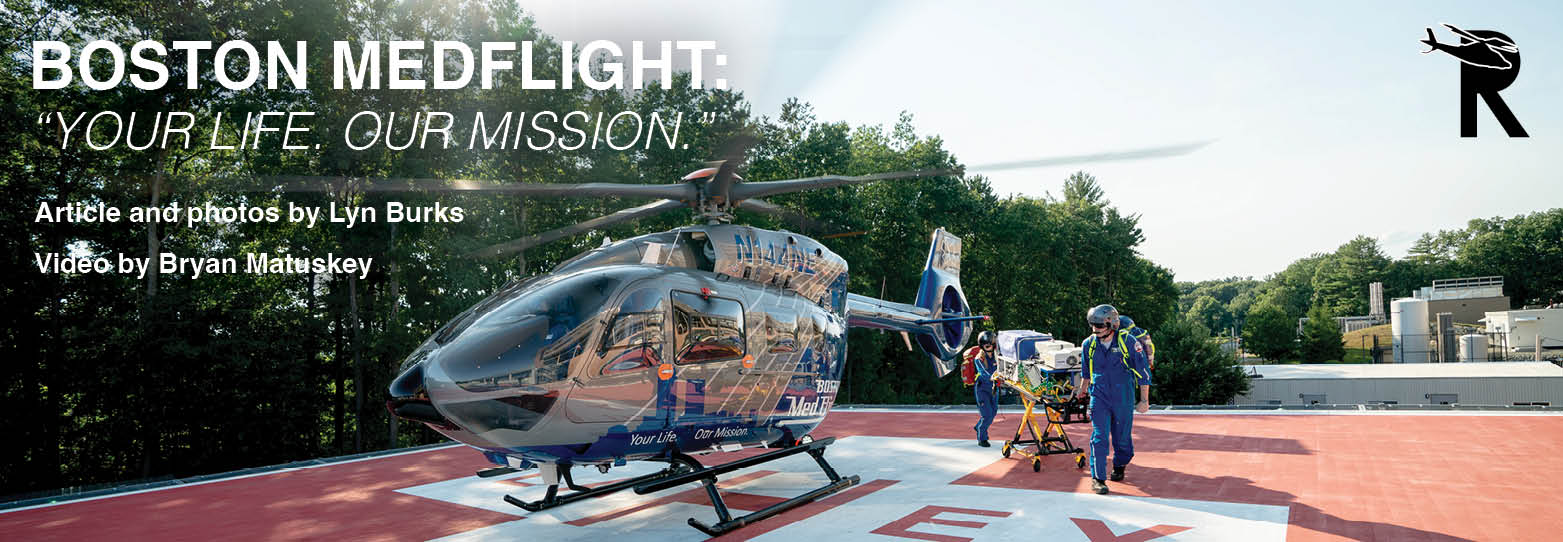
VIEW VIDEO
Greater Boston is the metropolitan region of New England that encompasses the capital of Massachusetts. Rich in history, Boston was founded on the Shawmut Peninsula in 1630 by Puritan settlers. The city was named after Boston, Lincolnshire, England. During the American Revolution, Boston was home to several events that proved central to the revolution and subsequent Revolutionary War, including the Boston Massacre (1770), the Boston Tea Party (1773), Paul Revere's poetic midnight ride (1775), the Battle of Bunker Hill (1775), and the Siege of Boston (1775–1776).
Greater Boston is ranked tenth in population among U.S. metropolitan statistical areas, being home to 4,941,632 people. Today, Boston has emerged as the largest biotechnology hub in the world. The city is a national leader in scientific research, medicine, engineering, business, and higher education.
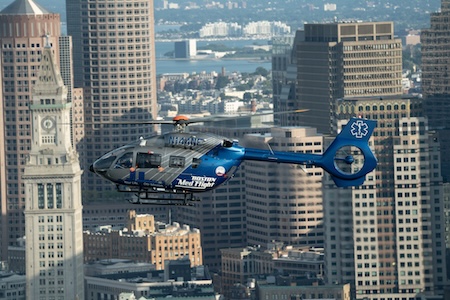
“The H145 D3 model has met all our expectations and has proven to be a reliable workhorse for our program.”
Serving New England
Boston MedFlight (BMF) was created by a consortium of six Boston-area academic medical centers in 1985. The organization was established as New England Life Flight Inc. as an independent, non-profit corporation to provide critical-care transport across eastern Massachusetts and New England; not just to serve the consortium hospitals, but to also be a service to its Commonwealth communities.
BMF’s primary service area is eastern Massachusetts, including Cape Cod, Nantucket and Martha’s Vineyard, but may respond as far as the neighboring states of Delaware, New Hampshire, Vermont, New York, Maine, Connecticut, Rhode Island, and Pennsylvania. BMF transported its first patient on 26 June 1985, a 14-year-old male injured in an explosion.
From that beginning, BMF’s mission has been to transport patients to the nearest appropriate medical facility, regardless of the patients’ ability to pay. Starting with one helicopter, two pilots, and eight clinical staff flying out of Logan International Airport, BMF has grown to six helicopters, two jets, nine critical care ground ambulances, and over 200 employees.
BMF serves the area from four bases across eastern Massachusetts which are located at Lawrence Municipal, Hanscom Field, Mansfield Municipal, and Plymouth Municipal airports. Each base is staffed 24/7 with a helicopter and ground ambulance. Some of the bases have dedicated ground-ambulance teams, while others have ground ambulances on days that are below flying weather minimums. The jets are based at headquarters located at Bedford-Hanscom Field. Operating from airports, whether controlled or uncontrolled, is important since they provide the IFR infrastructure BMF routinely needs for operations.
A major milestone was achieved in 2017 when BMF received its FAA Part 135 air carrier certificate and transitioned from a vendor program to an independent air operator. Later, in 2024, BMF became a licensed ambulance service in New Hampshire and Rhode Island.
The majority of BMF’s funding comes from insurance, Medicare, and Medicaid reimbursements. The organization does not bill patients for unreimbursed charges. According to the program, it provides over $7 million in unreimbursed transport costs each year. In addition to a subsidy from BMF’s consortium hospitals, the program has a very active fundraising operation. BMF consistently engages a number of organizations and individuals that support their mission through personal and corporate philanthropy.
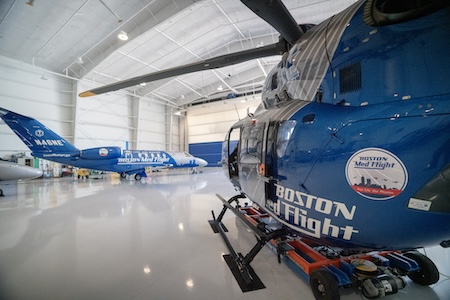
Aircraft Standardization
BMF achieved another major milestone in 2024 when the organization standardized its helicopter fleet with the five-bladed Airbus Helicopters H145 D3. This fleet standardization was envisioned over a decade ago with the goal to provide uniform training, maintenance, proficiency and enhanced safety in the program’s helicopter operations.
Several twin-engine helicopters were evaluated and the H145 D3 was selected for its performance, capacity, IFR-capabilities, maintenance, and training support. “The H145 D3 model has met all our expectations and has proven to be a reliable workhorse for our program. It is truly a pilot’s machine with power, maneuverability, and redundant systems. One of the best things about the D3 is the reduced pilot workload in the IFR environment. The autopilot system is intuitive and easy to manipulate, allowing the pilot time to manage the flight,” said Rick Kenin, COO of transport.
BMF pilots all attend initial H145 D3 factory training with eitherAirbus Helicopters or Copter Safety in Helsinki, Finland. Recurrent, Level D simulator training is provided by Airbus Helicopters or Copter Safety.
The majority of BMF’s maintenance is provided by seven BMF aviation maintenance technicians. The A&P technicians all attend factory training courses. BMF performs all helicopter inspections in-house, but has support contracts with Airbus Helicopters and Safran for maintenance that is not allowed under its Part 135 certificate.
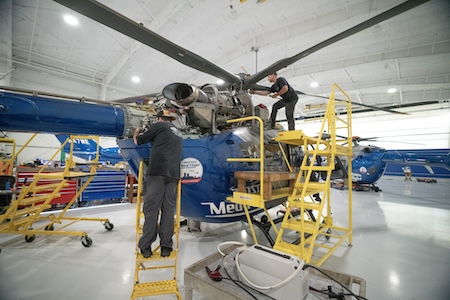
It’s About the Patient
BMF is a Commission on Accreditation of Medical Transport Services (CAMTS) accredited critical care transport service and the only dedicated, licensed, adult, ground critical care transport provider in the region.
BMF responds to both scene and interfacility transport calls. Scene calls make up less than 20% of overall transport volume, however the interfacility transports are typically the most seriously ill patients. Because Massachusetts has such a comprehensive network of community hospitals, trauma patients are often ground transported to nearby community hospitals for initial evaluation before BMF is called to transport to a Level 1 trauma center. Approximately 25% of BMF transports are neonatal and pediatric patients.
Critical care nurses and critical care paramedics are on every transport and are trained in a wide variety of skills from pediatrics to geriatrics. The program’s specialty services include IABP (balloon pumps), ECMO, neonatal isolettes and VADs. Additionally, they were the first EMS in Massachusetts to carry blood products onboard their vehicles. BMF’s nurses and paramedics average over 15 years of critical care experience.
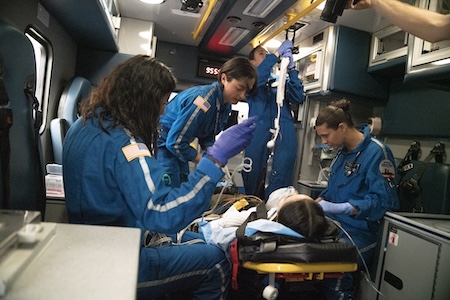
BMF’s helicopters, ambulances, and airplane have standardized medical equipment, including:
- Airway management equipment, including video and surgical airway devices
- Critical care monitor with invasive monitoring
- Inhaled vasodilators (epoprostenol and nitric oxide)
- The most advanced mechanical ventilator available (invasive and non-invasive)
- Helium/oxygen (Heliox) delivery (ground only)
- Intra-aortic balloon pump
- Multiple medication pumps preprogrammed with infusion library
- Transport isolette and ventilator
- Transvenous pacemaker
Crewmembers are also proficient in managing patients supported by specialty medical devices from sending hospitals, including:
- Extra-Corporeal Membrane Oxygenators (ECMO)
- Impella
- Ventricular assist devices
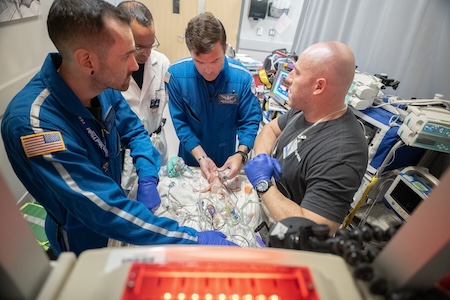
Unique
BMF considers itself unique in the critical care transport world. Besides being an independent, non-profit Part 135 air carrier, the organization has focused on leading edge technology—both vehicle and medical—to provide unsurpassed care for its patients.
For example, the in-house clinical simulation training BMF provides for its nurses and paramedics is unrivaled and novel in its inclusion of actual transport scenarios. The organization has high-fidelity simulation labs at its company headquarters and satellite bases in which it can simulate complex scenes that can range from night-time vehicle extraction operations to complicated pediatric patient emergencies and everything in between.
Another unique aspect of the operation is the development of a pilot incapacitation emergency procedures training course for its crew members. BMF has leased from Airbus Helicopters a desktop cockpit procedural training device which simulates the H145’s Helionix cockpit. Under the remote instruction of a pilot over the radio, and through coordination with ATC, clinical team members are guided to take control of the aircraft by using the four-axis autopilot and navigation system to fly an approach to a hover in the event of a pilot incapacitation emergency.
Of course, nothing works without good partners. Boston MedFlight relies and is fortunate to be able to count on a generous community of partners. These partners are made up of both individuals and organizations who choose to value and support the BMF mission.
In addition to the consortium hospitals, BMF cooperates with all the helicopter air ambulance programs in the region as founders of the North East Air Alliance (NEAA). This unique relationship is a conduit to: share best practices, attack safety concerns in the industry, and to most importantly assure that patients receive the right care at the right time. “Community partnership is key to our success. We consistently partner with local and regional EMS, community hospitals, and large health systems. From scene calls to training we see community partnerships as an incredibly important aspect of our mission and efforts,” said Kenin.
The multi-decades partnerships emphasize cooperation over competition for the betterment of all the programs. Through weekly notices to air-mission emails, monthly conference calls, and annual in-person meetings, the program is able to quickly disseminate regional information to the betterment of all operators.
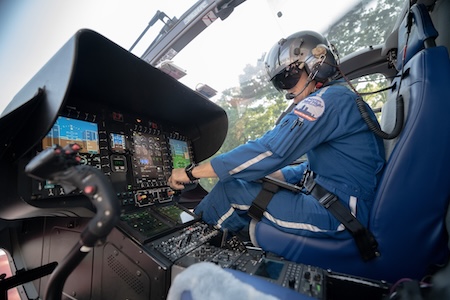
Chicken or egg?
Aircraft or crew? It’s a chicken-or-egg situation. One could theoretically go round and round about which is more important than the other.
Without the Airbus H145 D3 five-bladed helicopters, the crews could not perform their mission. On the other hand, without the expertise of the Boston MedFlight pilots, clinical staff members, mechanics, and communications specialists, the aircraft would only take up space in the hangar.
The truth is, it’s a symbiotic relationship that has taken nearly four decades to perfect. In fact, its carefully cultivated relationships have created a system that serves the visitors and citizens of New England in some of their most critical times of need.
VIEW VIDEO
READ MORE ROTOR PRO: https://justhelicopters.com/Magazine
WATCH ROTOR PRO YOUTUBE CHANNEL: https://buff.ly/3Md0T3y
You can also find us on
Instagram - https://www.instagram.com/rotorpro1
Facebook - https://www.facebook.com/rotorpro1
Twitter - https://twitter.com/justhelicopters
LinkedIn - https://www.linkedin.com/company/rotorpro1